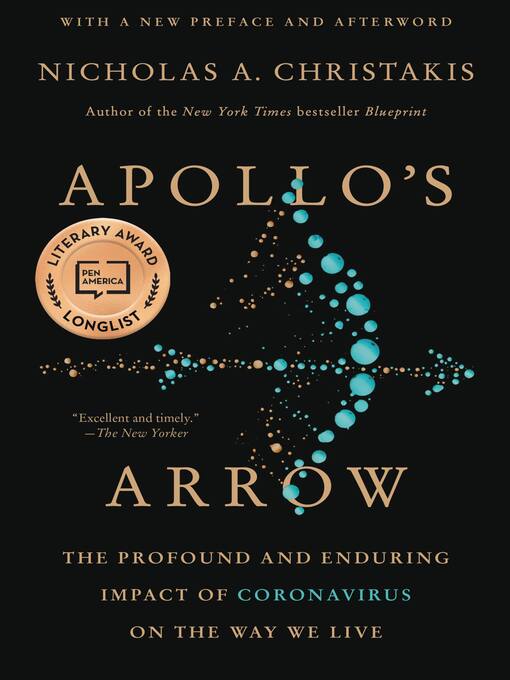
Apollo's Arrow
The Profound and Enduring Impact of Coronavirus on the Way We Live
کشف و تاثیر کورنوویروس بر روشی که ما زندگی میکنیم
کتاب های مرتبط
- اطلاعات
- نقد و بررسی
- دیدگاه کاربران
نقد و بررسی

October 9, 2020
Christakis (Blueprint: The Evolutionary Origins of a Good Society) focuses on the biology of the COVID-19 pandemic and our sociological responses to it. Beginning with a detailed history of the pandemic so far, the author then compares behavior during past pandemics with the current handling of the virus, including lessons not learned from previous epidemics. Christaki explains the biology of transmission and super-spreader events and the use of nonpharmaceutical interventions to slow the virus. Next, he discusses emotional responses to the pandemic, including the us vs. them mentality and how the pandemic has become politicized. It is easier to blame others for our circumstances than to admit that we are feeling powerless, he maintains. This is the first pandemic in which social media has been a factor in spreading misinformation and distrust of science. Also explored is eventual immunity and how it may become a factor in hiring, housing, and immigration; and what the postpandemic future may look like in various areas of life. VERDICT An excellent overview of the pandemic thus far, this work will be of interest to those seeking a full explanation of how we got where we are in terms of the virus and the direction we might be going.--Rachel Owens, Daytona State Coll. Lib., FL
Copyright 2020 Library Journal, LLC Used with permission.

October 15, 2020
An authoritative analysis of the Covid-19 pandemic, from its beginning to its hoped-for end. Sociologist and physician Christakis, who directs the Human Nature Lab at Yale, offers a cogent, deeply informative overview of the coronavirus pandemic, taking into consideration the biology of the pathogen and the social, economic, psychological, and political impacts of the virus on society. Drawing on scientific, medical, and sociological research, he assesses the transmission of the virus, responses worldwide, and prognosis for the pandemic's end. In addition, he places Covid-19 in the context of past epidemics: plague in ancient Athens, the Black Death in medieval Europe, polio epidemics in 1916 and the 1950s, influenza in 1918, and HIV in the 1980s. "It's very important to emphasize that, as bad as COVID-19 is," writes the author, "it's not remotely as bad as epidemics of bubonic plague, cholera, or smallpox that have killed much larger fractions of the population and that have had much larger and longer-lasting effects." Nevertheless, he underscores the disastrous effect of inadequate responses, especially from the Trump administration: a "botched" rollout of early tests, lack of coherent national strategy, and repeated "denial and lies." It's inarguable, he writes, that "the lack of scientific literacy, capacity for nuance, and honest leadership hurt us." Christakis emphasizes the importance of wearing masks and enforcing social distancing, two interventions that slow the spread of the virus, which is essential while treatments and vaccines are being developed. While acknowledging "colossal uncertainty" about the future of the pandemic, he predicts that at least until 2022, Americans will live in a changed world. It will be necessary to wear masks, abstain from shaking hands, avoid crowds, and receive medical care online rather than in person. Hopefully, he writes, "one of the unexpected impacts...may be that a society that feels besieged by the threat of the virus will increasingly treat scientific information, and not just scientists, seriously." A welcome assessment of the reality of the epidemic that has changed our lives.
COPYRIGHT(2020) Kirkus Reviews, ALL RIGHTS RESERVED.

November 16, 2020
Physician and sociologist Christakis (Blueprint), director of the Human Nature Lab at Yale University, delivers a comprehensive and evidence-based rundown of the Covid-19 pandemic from December 2019 to August 2020. He explains that genetic sequencing indicates Covid-19 most likely originated in bats, and details how Chinese officials “abruptly yielded to reality and changed course” after initially silencing doctors who warned of an outbreak in Wuhan. The Washington state man who was the first person to test positive in the U.S. on Jan. 20, 2020, doesn’t appear to have infected anyone else, according to Christakis, and recent evidence suggests the disease was already present in other parts of the West Coast. Christakis also laments how recommendations against “universal mask adoption” undermined the credibility of U.S. authorities in the early months of the pandemic, and cites evidence of lower death rates in countries where mask wearing “had always been the norm.” Taking the history of the bubonic plague in medieval Europe as a guide, he predicts that consumer spending “will come back with a vengeance” when the pandemic’s “intermediate” period ends around 2024. Readers will be enlightened by this lucid, well-informed first draft of the history of Covid-19.

























دیدگاه کاربران